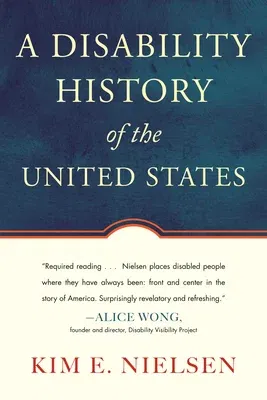The first book to cover the entirety of disability history, from
pre-1492 to the present
Disability is not only the story of someone we love or the story of whom
we may become; rather it is undoubtedly the story of our nation.
Covering the entirety of US history from pre-1492 to the present, A
Disability History of the United States is the first book to place the
experiences of disabled people at the center of the American narrative.
In many ways, it's a familiar telling. In other ways, it is a radical
repositioning of US history. By doing so, the book casts new light on
familiar stories, such as slavery and immigration, while breaking ground
about the ties between nativism and oralism in the late nineteenth
century and the role of ableism in the development of democracy.
A Disability History of the United States pulls from primary-source
documents and social histories to retell US history through the eyes,
words, and impressions of the people who lived it. As historian and
disability scholar Nielsen argues, to understand disability history
isn't to narrowly focus on a series of individual triumphs but rather to
examine mass movements and pivotal daily events through the lens of
varied experiences. Throughout the book, Nielsen deftly illustrates how
concepts of disability have deeply shaped the American experience--from
deciding who was allowed to immigrate to establishing labor laws and
justifying slavery and gender discrimination. Included are absorbing--at
times horrific--narratives of blinded slaves being thrown overboard and
women being involuntarily sterilized, as well as triumphant accounts of
disabled miners organizing strikes and disability rights activists
picketing Washington.
Engrossing and profound, A Disability History of the United States
fundamentally reinterprets how we view our nation's past: from a
stifling master narrative to a shared history that encompasses us all.
About the Series
Beacon Press's ReVisioning History series consists of accessibly written
books by notable scholars that reconstruct and reinterpret US history
from diverse perspectives.

